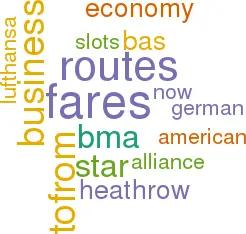Potential Star attack on UK premium traffic
November 1999


Lufthansa has announced that it is in negotiations with British Midland about taking half of SAS’s 40% stake in the carrier. No great surprise here — despite BMA being linked with every possible alliance, the terms of the shareholder agreement between SAS and Sir Michael Bishop and associates (see Aviation Strategy, October 1999) made it very difficult for an airline other than a Star member to buy into BMA. What was surprising was the forcefulness of BA’s announcement of the probable deal, railing at unfair competitive practices, the inequities of former state aid injections, etc.
The reason behind BA’s concern is indicated by this estimated breakdown of slots at Heathrow and Frankfurt. If BMA’s 14% of slots are added to Star total Fortress Heathrow begins to look pregnable — indeed, the Star alliance now has a substantial second position, a bit like the split between United and American at Chicago.
| LHR | FRA | ||
| Domestic | oneworld | 58 | 0 |
| Star | 11 | 95 | |
| Intra-Europe | oneworld | 38 | 6 |
| Star | 18 | 53 | |
| Atlantic | oneworld | 66 | 5 |
| Star | 19 | 59 | |
| Other | oneworld | 36 | 1 |
| Star | 11 | 57 | |
| Total | oneworld | 42 | 3 |
| Star | 25 | 66 |
BA appears to be particularly annoyed by Lufthansa’s near monopoly on German domestic routes to/from Frankfurt and its dominance on intra–European routes to/from its main hub, in contrast to the much more competitive markets to/from Heathrow (or rather London).
This structure is reflected in comparative fares. According to American Express Corporate Travel Index both German business and economy fares on short/medium–haul routes are well above the European average and perhaps 20% above comparable UK fares. Also, the degree of competition squeezes the difference between business and economy fares on short/medium routes from the UK.
However, a different picture emerges on the long–haul business class routes to/from the UK. These fares command a premium, and this strongly influences the average UK fare. Again according to Amex, published business class fares to/from the UK, weighted by actual traffic flows, are noticeably higher than those to/from Germany (although this difference is probably inflated as corporate discounts tend to more generous in the UK). Interestingly, the gap between UK business and economy fares widens substantially with distance travelled, whereas this does not happen with German fares.
| Germany | UK | Germany | |
| higher (lower) | |||
| than UK | |||
| First | 6059 | 7896 | -23% |
| Business | 1081 | 1758 | -39% |
| Full Economy | 1002 | 841 | 19% |
| Discount Economy | 958 | 779 | 23% |
On this analysis, BA’s concentration on business travel, downsizing of economy capacity and intra–European cut–backs would appear to have a logical foundation. BA’s concern may not be so much Star’s appearance in the short/medium haul markets ex–London — these routes haven’t been particularly profitable for BMA, and Lufthansa ownership is not going to change that situation. The danger is that the BMA slots could eventually be used for transatlantic flights, operated probably by BMA with LH/UA code–shares.
So BA now has even more incentive than before to use its influence to block changes to the Bermuda 2 bilateral. But then an immunised code–share with American is not just postponed, it is definitively cancelled.
The unpredictable factor in all this is Virgin Atlantic. Richard Branson has been making noises about joining a global alliance, and recent reports indicate that Virgin’s profitability on transatlantic routes is eroding. Following his failure in the US courts to prove accusations of anti–competitive behaviour against BA (this time on the question of over–ride commissions), would he now be tempted to ally with Lufthansa and United to give Star a new long–haul operation from Heathrow — a "my enemy’s enemy is my friend" strategy?